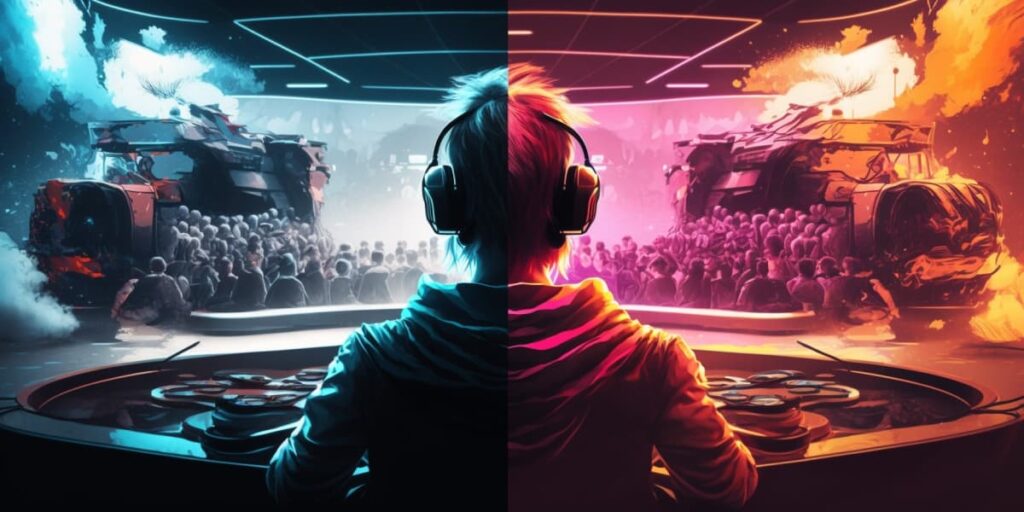Video gaming has come a long way from being a simple hobby to a potential career choice. The gaming industry is flourishing, and many individuals are exploring ways to generate income from their passion for gaming. In this comprehensive guide, we will explore 20 different ways to make money playing video games. Whether you’re a casual gamer or a dedicated professional, there’s something for everyone.
Streaming on Platforms like Twitch and YouTube.

Streaming has become one of the most popular ways gamers can make money while playing video games. Platforms like Twitch and YouTube Gaming allow players to broadcast their gameplay live to viewers around the world. Successful streamers can earn significant income through various monetization methods such as ads, donations, and subscriptions.
You’ll need a decent gaming setup to start streaming, including a powerful PC or console, a high-quality microphone, and a webcam for face-cam interactions. You’ll also need a stable internet connection with sufficient upload speed to ensure a smooth streaming experience for your viewers.
One of the essential factors for success as a streamer is consistency. You should create and stick to a schedule, letting your audience know when to expect your content. Additionally, engaging with your viewers through chat and social media helps build a loyal community around your channel. Interacting with your audience is critical to creating a friendly and welcoming environment, encouraging viewers to return and recommend your channel to others.
In order to monetize your channel, you can join Twitch’s Partner Program or YouTube’s Partner Program. These programs enable you to earn revenue from ads displayed during your streams and paid subscriptions offered to your viewers.
Creating Gaming Content on YouTube.
YouTube has become a go-to platform for gamers to share their passion and knowledge about video games with others. Creating gaming content on YouTube is another viable way to make money while playing video games. There are various types of content that you can create, including gameplay videos, tutorials, reviews, and game-related discussions.
To begin creating content, you’ll need a reliable gaming setup with a PC or console, screen recording software, a microphone, and video editing software. Investing time in learning video editing techniques is crucial, as high-quality content is more likely to attract and retain viewers.
Consistency is vital for success on YouTube, just as it is on streaming platforms. Establish a regular upload schedule to maintain your audience’s interest and encourage growth. In addition to consistency, ensure that your content is engaging, informative, and entertaining. This can be achieved by incorporating humor, storytelling, or unique perspectives into your videos.
To optimize your channel for growth, focus on search engine optimization (SEO) strategies for YouTube. This includes researching relevant keywords, creating eye-catching thumbnails, and writing engaging video titles and descriptions. By doing so, your videos will have a higher chance of being discovered by potential viewers.
Once your channel reaches the eligibility criteria for YouTube’s Partner Program, you can apply to join and monetize your content through ads, channel memberships, and Super Chats. Additionally, you can explore other monetization options, such as sponsorships and affiliate marketing. Partnering with gaming-related brands or promoting products through affiliate links can provide additional income streams.
As you grow your audience and establish yourself as a credible gaming content creator, opportunities for collaborations with other YouTubers may arise.
Participating in Esports Tournaments.

Esports has rapidly grown into a multi-billion-dollar industry, with professional gamers competing in various tournaments and leagues for cash prizes, sponsorships, and prestige. Participating in esports tournaments is a lucrative way for skilled gamers to make money while playing their favorite video games.
To become a professional esports player, you need to be highly skilled and dedicated to a specific game. Popular esports titles include League of Legends, Dota 2, Counter-Strike: Global Offensive, Overwatch, and Fortnite. To excel in these games, you must invest significant time in practice, refining your skills and strategies. Watching and analyzing professional matches can also help you learn from top players and improve your gameplay.
Many professional esports players start their journey by participating in amateur tournaments and online leagues. This allows them to gain experience, build their reputation, and network with other players and team managers. As you progress and demonstrate your skills, you may be approached by professional gaming organizations or have the opportunity to join established teams.
Once you’ve become a part of a professional team, you’ll participate in regional, national, and international tournaments. The cash prizes for winning these tournaments can be substantial, with some events offering millions of dollars in prize money. Top esports players also have the opportunity to secure sponsorships and endorsements from gaming-related brands, further boosting their income.
Building a social media and streaming platform presence can also contribute to your success as a professional esports player.
Speedrunning.
Speedrunning is the practice of completing a video game or specific game objectives as quickly as possible. The speedrunning community has grown exponentially over the years, with players competing to set world records and showcase their skills in various games. Speedrunners can make money by streaming their attempts, participating in charity events, and securing sponsorships.
To become a successful speedrunner, you must first choose a game you enjoy and are willing to invest a significant amount of time in mastering. Popular speedrunning titles include Super Mario Bros., The Legend of Zelda: Ocarina of Time, and Dark Souls, among others. Research the game’s mechanics, glitches, and shortcuts to developing strategies that minimize completion time.
Practicing your chosen game consistently is essential for improving your skills and achieving faster completion times. Engaging with the speedrunning community can provide valuable insights, tips, and opportunities for collaboration and competition. Websites like Speedrun.com and Speed Demos Archive (SDA) serve as resources and platforms for sharing speedrunning achievements and strategies.
Streaming your speed runs on platforms like Twitch and YouTube can help you gain a following and monetize your efforts. Your streams can feature world record attempts, practice sessions, or casual speed runs. Building a loyal audience can generate revenue through ads, donations, and subscriptions.
Speedrunning events like Games Done Quick (GDQ) showcase top speedrunners from around the world, raising money for charity through viewer donations. Participating in these events can increase your exposure and create opportunities for sponsorships or partnerships with gaming brands.
As you continue to refine your skills and achieve faster completion times, you can solidify your reputation within the speedrunning community. This can lead to additional income opportunities, such as coaching, content creation, or collaborations with other speedrunners.
Game Testing and QA.
Game testing and quality assurance (QA) play a crucial role in game development, ensuring that games are free from bugs, glitches, and other issues that could negatively impact the player experience. As a game tester, you can make money by helping game developers identify and fix problems in their games.
To become a successful game tester, you need to possess a keen eye for detail, strong analytical skills, and excellent communication abilities. Game testers must be able to identify issues, reproduce them consistently, and provide clear feedback to developers, allowing them to fix the problems effectively. Familiarity with different gaming platforms and genres, as well as a basic understanding of game design principles, is also beneficial.
Game testing positions can be found through job boards, game development company websites, and industry events. Both freelance and full-time opportunities are available, depending on your preferences and availability. As you gain experience and build a reputation for thorough testing and valuable feedback, you may be able to secure higher-paying positions or work with more prominent game developers.
In addition to traditional game testing roles, there are opportunities for specialized testing positions. For example, some testers focus on localization, ensuring that games are accurately translated and culturally appropriate for different regions. Others may specialize in hardware testing, working with console manufacturers to ensure compatibility and performance across various devices.
As a game tester, you have the unique opportunity to play and experience games before they are released to the public. This can provide valuable insights into industry trends and upcoming titles, potentially informing your future gaming endeavors. Additionally, game testing can serve as a stepping stone into other roles within the gaming industry, such as game design, production, or community management.
By pursuing a career in game testing and QA, you can make money while playing video games and contribute to developing high-quality gaming experiences for players worldwide.
Coaching and Tutoring.

As the gaming industry continues to grow, many players seek ways to improve their skills and gain a competitive edge. Coaching and tutoring services have become increasingly popular, allowing skilled gamers to make money by sharing their expertise and helping others improve their gameplay.
To become a successful gaming coach or tutor, you need to deeply understand your chosen game’s mechanics, strategies, and meta. Additionally, strong communication and teaching skills are essential for conveying complex ideas and concepts in an easily digestible manner.
Popular games for coaching and tutoring services include League of Legends, Fortnite, Dota 2, and Call of Duty, among others. However, you can offer coaching in any game where there is a demand for improvement and a willingness to pay for expert guidance.
Create a website or online profile detailing your gaming experience, achievements, and coaching philosophy to start your coaching business. This will serve as your portfolio, showcasing your skills and helping potential clients understand the value you can provide. You can also leverage social media platforms and gaming forums to advertise your services and connect with potential clients.
Coaching sessions can be conducted through various means, such as video calls, in-game voice chat, or even in-person meetings. You can offer one-on-one sessions or group lessons depending on your preferences and client needs. You can also create packages and lesson plans tailored to specific skill levels, goals, or aspects of the game.
As your coaching business grows, consider seeking feedback and testimonials from satisfied clients to bolster your reputation and attract new customers. You can also create and share free content, such as video tutorials, guides, or blog posts, to demonstrate your expertise and establish yourself as an authority in your chosen game.
By offering coaching and tutoring services, you can make money while playing video games and help others improve their skills, fostering a sense of accomplishment and satisfaction in their gaming endeavors.
Selling In-game Items and Currency.

The virtual economies of many online games create opportunities for players to make money by selling in-game items, currency, or even accounts. These transactions typically occur through online marketplaces, forums, or social media platforms. However, checking the game’s terms of service before engaging in such activities is crucial. Some games prohibit these transactions and may enforce penalties, such as account bans or suspensions.
To start making money by selling in-game items and currency, you’ll need to choose a game with a strong player base and demand for virtual goods. Popular titles for this type of activity include World of Warcraft, Final Fantasy XIV, and Path of Exile. You’ll need to invest time and effort in the game to acquire valuable items or currency, either by farming, crafting, or trading with other players.
Once you have a collection of items or currency to sell, you can list them on online marketplaces dedicated to virtual goods, such as PlayerAuctions or G2G. These platforms facilitate transactions between buyers and sellers, ensuring a secure and smooth process. It’s important to research the market value of your items and price them competitively to attract potential buyers.
Alternatively, you can sell your items directly to other players through in-game chat, forums, or social media groups. While this approach may offer higher profit margins, it also comes with increased risks, such as scams or disputes. To minimize these risks, be sure to use secure payment methods and maintain open communication with your buyers.
As you gain experience and build a reputation as a reliable seller, you can explore other monetization opportunities within the virtual economy, such as account selling or boosting services. However, always be aware of these activities’ potential risks and consequences.
By selling in-game items and currency, you can make money playing video games while contributing to the in-game economy and community. Just ensure that you abide by the game developers’ rules and regulations to avoid potential penalties.
Becoming a Video Game Journalist or Reviewer.

The gaming industry’s continuous growth has created a high demand for insightful, informative, and engaging content. As a video game journalist or reviewer, you can make money by sharing your opinions, analysis, and news about the latest games, industry events, and trends.
To become a successful video game journalist or reviewer, you’ll need excellent writing and communication skills, as well as a deep understanding of the gaming industry and its various genres. Developing a unique voice and perspective is essential, allowing your content to stand out from the competition.
Begin by creating a portfolio of your written work, including game reviews, news articles, and opinion pieces. This portfolio can be hosted on a personal blog or website or shared through platforms like Medium. Regularly update your portfolio with new content, showcasing your versatility and expertise across a range of gaming topics.
Once you’ve established a solid portfolio, you can start pitching your work to gaming websites, magazines, and other publications. Many outlets accept freelance submissions or offer staff positions, depending on your experience and availability. As you gain exposure and build your reputation as a video game journalist or reviewer, you may have the opportunity to secure higher-paying gigs or full-time roles.
In addition to written content, you can also explore other formats, such as video reviews, podcasts, or live streams. By diversifying your content, you can reach a broader audience and create additional income streams through ads, sponsorships, and affiliate marketing.
As a video game journalist or reviewer, you’ll have the unique opportunity to share your passion for gaming with others while staying informed about the latest industry news and trends. Building relationships with game developers, publishers, and PR representatives can also lead to exclusive access to game previews, events, and interviews, further enhancing your content and credibility.
By pursuing a career in video game journalism or reviewing, you can make money playing video games while informing and entertaining fellow gamers, contributing to the thriving gaming community, and shaping the discourse around the games we love.
Creating Game Guides and Walkthroughs.

As players explore new games or strive to overcome challenging levels, they often turn to game guides and walkthroughs for assistance. Creating comprehensive, informative, and well-structured game guides and walkthroughs allows you to make money while playing video games and helping others navigate their gaming experiences.
To create successful game guides and walkthroughs, you need to deeply understand the game in question, including its mechanics, story, and progression. You should be able to clearly explain game concepts, strategies, and solutions to problems in an easily understandable manner. Strong writing and communication skills and the ability to structure your guides logically and coherently are essential.
You can create game guides and walkthroughs in various formats, such as written articles, video tutorials, or interactive maps and tools. Choose the format that best suits your skills and the type of content your target audience prefers. Experimenting with different layouts and styles can help you discover what resonates with your audience and sets your content apart from the competition.
To monetize your game guides and walkthroughs, you can publish them on your website or blog and generate revenue through ads, sponsorships, or affiliate marketing. Alternatively, you can create content for established gaming websites or platforms like GameFAQs, which may offer payment for high-quality guides and walkthroughs.
Another option is to publish your guides as e-books or physical books, which can be sold through online marketplaces like Amazon or your online store. If you choose this route, ensure that your guides are professionally edited and formatted, as well as regularly updated to reflect changes and updates to the game.
Promoting your content through social media, gaming forums, and other online communities can help you reach a wider audience and establish yourself as an authority in your chosen game. As your reputation grows, you may have the opportunity to collaborate with other creators, secure sponsorships, or even work directly with game developers and publishers.
By creating game guides and walkthroughs, you can make money playing video games while providing valuable resources to fellow gamers, enhancing their enjoyment and success in their favorite games.
Developing and Selling Game Mods or Add-ons.
The gaming community is always seeking new ways to enhance and customize its gaming experiences. Developing game mods or add-ons allows creative gamers to make money by providing unique content, features, or improvements to existing games.
To create successful game mods or add-ons, you’ll need a strong understanding of game design principles, programming languages, and the specific game’s modding tools or software development kit (SDK). Many popular games, such as Skyrim, Minecraft, and Grand Theft Auto V, have thriving modding communities and extensive resources for aspiring modders.
Begin by identifying a game you’re passionate about and with a strong player base interested in mods or add-ons. Research the game’s modding scene and familiarize yourself with popular mods, community expectations, and available tools or resources. Developing your skills in programming, 3D modeling, or other relevant disciplines can also greatly benefit your modding endeavors.
Once you’ve created a mod or add-on, ensure it’s thoroughly tested and free of bugs or compatibility issues. Collaborate with the game’s modding community for feedback, suggestions, and assistance refining your creation.
To monetize your mods or add-ons, you can either sell them directly or offer them for free with optional donations or “pay-what-you-want” pricing. Platforms such as Nexus Mods, Steam Workshop, or the Minecraft Marketplace provide infrastructure for distributing and selling your creations. However, adhering to the game’s terms of service and modding guidelines is crucial, as some developers may restrict or prohibit the sale of mods or add-ons.
Promote your mods or add-ons through social media, gaming forums, and modding community websites to reach a wider audience and gain visibility for your work. As your reputation grows, you may have the opportunity to collaborate with other modders, receive commissions for custom mods, or even secure a job within the gaming industry.
By developing and selling game mods or add-ons, you can make money playing video games while contributing to the gaming community and enhancing the experiences of fellow gamers. As you hone your skills and develop a portfolio of successful mods, you can turn your passion for gaming into a profitable and fulfilling career.
Creating Video Game-inspired Merchandise.

As video games continue to captivate audiences worldwide, fans are eager to express their love for their favorite titles through merchandise. By creating and selling video game-inspired merchandise, you can make money while playing video games and connecting with fellow enthusiasts.
To create successful video game-inspired merchandise, you’ll need a keen sense of design, an understanding of the gaming community’s preferences, and familiarity with the intellectual property rights of the games you’re drawing inspiration from. Developing graphic design, illustration, or 3D modeling skills can be beneficial in creating unique and visually appealing merchandise.
Begin by identifying the types of merchandise you’d like to create, such as t-shirts, posters, figurines, or accessories. Consider the games and franchises that inspire you and have a strong fanbase. Research existing merchandise and fan art to understand trends, popular themes, and potential gaps in the market.
When creating your designs, you must be mindful of intellectual property rights and avoid using copyrighted material without permission. Instead, focus on creating original, inspired designs that evoke the spirit of the game without infringing on the rights of the developers or publishers.
To produce and sell your merchandise, you can partner with print-on-demand services like Printful or Redbubble, which handle your business’s manufacturing, shipping, and customer service aspects. Alternatively, you can produce your merchandise independently and manage your inventory, shipping, and customer service.
Create an online store to showcase and sell your products using platforms like Etsy, Shopify, or WooCommerce. Promote your merchandise through social media, gaming forums, and other online communities where fans of the games you’re inspired by will likely gather.
As your merchandise business grows, you can expand your product range, collaborate with other creators, or even secure licensing agreements with game developers and publishers. By creating video game-inspired merchandise, you can make money playing video games while expressing your creativity and passion for gaming through unique, tangible products that resonate with fellow fans.
Affiliate Marketing.
Affiliate marketing is a popular and effective way to make money online, including within the gaming industry. By promoting products or services related to video games, you can earn commissions on sales generated through your referrals, leveraging your gaming expertise and audience to generate income.
To succeed in affiliate marketing within the gaming industry, you’ll need to build an audience and establish yourself as a trustworthy source of information and recommendations. This can be achieved through various platforms, such as blogs, YouTube channels, Twitch streams, or social media accounts. Creating high-quality, engaging, and valuable content that showcases your gaming knowledge and passion is essential for attracting and retaining an audience.
Begin by researching and joining affiliate programs relevant to your niche and audience. Popular gaming-related affiliate programs include Amazon Associates, Humble Bundle, Green Man Gaming, and many game developers or publishers with their affiliate programs. Always ensure that you’re promoting products or services you genuinely believe in and resonate with your audience.
Once you’ve joined an affiliate program, you can start incorporating affiliate links or promotional materials into your content. Be transparent about your affiliate partnerships with your audience and disclose any potential conflicts of interest. Building trust with your audience is crucial for successful affiliate marketing.
To maximize your affiliate income, focus on creating high-quality content that provides value to your audience through game reviews, tutorials, news, or entertainment. Engage with your audience through comments, social media, or live streams to build a community and foster loyalty.
As your audience and reputation grow, you may have the opportunity to secure exclusive partnerships and sponsorships or even create your affiliate program for products or services you develop. You can continually optimize your affiliate marketing strategy by staying informed about the latest gaming trends and tailoring your content to your audience’s preferences.
By leveraging affiliate marketing within the gaming industry, you can make money playing video games while providing valuable content and recommendations to fellow gamers. As you hone your skills and grow your audience, the potential for generating substantial income through affiliate marketing increases.
In-game Coaching.
In-game coaching offers an opportunity for skilled gamers to make money by helping others improve their gameplay and achieve their goals within a particular game. By sharing your knowledge, expertise, and strategies, you can make money playing video games and contribute to the gaming community by helping players reach their full potential.
To become a successful in-game coach, you need to deeply understand the game you’re coaching, including its mechanics, meta, and best practices. Additionally, you need strong communication and teaching skills to convey complex ideas and concepts effectively and patiently.
Popular games for in-game coaching include competitive titles such as League of Legends, Dota 2, Fortnite, and Call of Duty, among others. However, you can offer coaching services in any game where there is a demand for improvement and players are willing to invest in expert guidance.
Start by creating an online profile or website showcasing your gaming experience, achievements, and coaching philosophy. This will serve as your portfolio, allowing potential clients to understand the value you can provide. Advertise your services through social media platforms, gaming forums, or even within the game’s community.
In-game coaching sessions can be conducted via various means, such as video calls, in-game voice chat, or even in-person meetings if feasible. You can offer one-on-one coaching, group sessions, or coaching packages tailored to specific skill levels, goals, or aspects of the game.
As your coaching business grows, consider seeking feedback and testimonials from satisfied clients to enhance your reputation and attract new customers. You can also create and share free content, such as video tutorials, guides, or blog posts, to demonstrate your expertise and establish yourself as an authority in your chosen game.
In-game coaching allows you to monetize your gaming skills while helping others improve their gameplay and achieve their goals. By offering personalized guidance and sharing your gaming expertise, you can positively impact the gaming community and turn your passion for video games into a profitable and fulfilling endeavor.
Game Localization and Translation.
As the gaming industry continues to expand globally, there is a growing demand for game localization and translation services. By providing accurate and culturally appropriate translations of game content, you can make money playing video games while helping to bridge language barriers and make games accessible to a broader audience.
To succeed in game localization and translation, you need to be proficient in at least two languages, with a strong understanding of both cultures and their nuances. Familiarity with gaming terminology and concepts, as well as experience in playing a variety of games, is essential to accurately translate and localize game content.
Game localization and translation involve more than simply converting text from one language to another. It also requires adapting cultural references, idioms, and humor to ensure the game’s narrative and dialogue are engaging and relevant to the target audience. In some cases, this may involve reworking elements of the game’s story, characters, or settings to better align with the local culture.
Begin by building a portfolio showcasing your translation and localization skills, including examples of translated game content, such as in-game text, dialogue, subtitles, or even marketing materials. You can offer your services freelance or seek employment with game developers, publishers, or localization agencies specializing in game translation.
Promote your localization and translation services through online platforms, such as LinkedIn, ProZ, or TranslatorsCafe, and network within the gaming and localization industries to establish connections and find potential clients or job opportunities.
As you gain experience and build a reputation for high-quality game localization and translation, you may have the opportunity to work on larger projects or secure long-term contracts with game developers and publishers. You can also consider specializing in a particular genre or platform, further differentiating yourself within the industry.
By offering game localization and translation services, you can make money playing video games while helping to make games more accessible and enjoyable for players around the world. As the gaming industry continues to grow and evolve, the demand for skilled localization and translation professionals will only increase, providing ample opportunities for those with the necessary language skills and gaming expertise.
Voice Acting.
Voice acting has become integral to modern video games, providing players with an immersive and emotionally engaging experience. By lending your voice to characters, narrators, or announcers in games, you can make money playing video games while contributing to the artistry and storytelling that make games so compelling.
To become a successful voice actor in the gaming industry, you must develop your vocal skills, including diction, range, and the ability to convey emotions effectively. Familiarizing yourself with various game genres and styles can help you understand the types of voices and performances in demand.
Begin by creating a voice acting demo reel that showcases your vocal range, versatility, and ability to portray different characters or emotions. Your demo reel should include various samples of your work, such as character voices, narration, or even impersonations of popular game characters. You can also create a website or online profile to display your demo reel and provide potential clients with an easy way to contact you.
Promote your voice-acting services through social media, online forums, or networking events within the gaming and entertainment industries. You can also seek out auditions or opportunities on platforms like Casting Call Club, Voice123, or Backstage, which cater to voice actors looking for work.
As a voice actor, you may be hired on a project-by-project basis or secure a long-term contract with a game developer or publisher. As your reputation grows, you may have the opportunity to work on high-profile games, collaborate with other voice actors, or even transition into other areas of the gaming or entertainment industries.
Consider investing in professional-grade recording equipment and suitable recording space to produce high-quality voice recordings. This can help you stand out from the competition and enhance your chances of securing voice-acting roles.
By pursuing a career in voice acting within the gaming industry, you can make money playing video games while bringing characters and stories to life. As games evolve and the demand for immersive storytelling grows, skilled voice actors will remain an essential part of the gaming experience.
Game Development.
Game development offers a wide range of opportunities for creative and technically skilled individuals to make money by creating their video games or contributing to developing larger projects. As a game developer, you can bring your ideas to life and share your passion for gaming with players worldwide.
To become a successful game developer, you’ll need to acquire diverse skills, including programming, game design, art, animation, and sound design, depending on your area of interest. Familiarizing yourself with popular game engines, such as Unity, Unreal Engine, or Godot, can also be beneficial for creating your games or collaborating with others.
Begin by honing your skills in your chosen area of game development and creating a portfolio showcasing your work. This can include completed games, prototypes, or individual assets, such as character models, environments, or animations. Your portfolio should demonstrate your abilities, creativity, and passion for game development.
You can choose to develop games independently or as part of a team. Independent game development, or “indie” development, allows for greater creative freedom and control over your projects but may require a broader skill set and more time investment. On the other hand, working as part of a team allows you to specialize in a particular area of game development and collaborate with others to bring a project to fruition.
Once you’ve completed a game or game prototype, you can distribute and monetize your creation through various platforms, such as Steam, itch.io, or the app stores of major gaming consoles. Promote your game through social media, gaming forums, and industry events to generate buzz and attract players.
As your reputation within the gaming industry grows, you may have the opportunity to work on larger projects, secure funding from publishers or investors, or even start your game development studio. You can also consider offering your development services freelance or contract to other developers or companies.
By pursuing a career in game development, you can make money playing video games while actively shaping players’ experiences worldwide. As the gaming industry continues to expand, the demand for innovative and skilled game developers will only increase, providing ample opportunities for those with the talent and passion for succeeding.
Renting out Your Gaming Server.
Renting out gaming servers is a niche yet profitable way to make money playing video games. Many online multiplayer games require dedicated servers to host matches, facilitate communication, and maintain a stable gaming environment. You can generate income while supporting the gaming community by providing reliable and high-performance servers for these games.
To successfully rent out gaming servers, you must comprehend server administration, networking, and the specific requirements of the games you wish to support. Familiarity with popular server software, such as Minecraft’s Bukkit or Team Fortress 2’s Source Dedicated Server, can be beneficial in offering tailored solutions for various games.
Begin by researching the market and identifying games with active communities and demand for server hosting. Popular games for server rentals include Minecraft, ARK: Survival Evolved, Rust, and Counter-Strike: Global Offensive, among others. Consider factors such as server performance, latency, and capacity when selecting a server hosting provider or building your server infrastructure.
Once you’ve set up your gaming server, create a website or online platform to showcase your services and allow clients to rent server space. Clearly outline your server specifications, pricing plans, and additional features, such as custom mods, game modes, or administrative tools. To cater to different client’s needs, offer various rental options, such as hourly, daily, or monthly rates.
Promote your server rental services through social media, gaming forums, or targeted advertising within the communities of the games you support. Establishing a reputation for reliable, high-quality server hosting can help you attract and retain clients, as well as generate referrals through word of mouth.
As your server rental business grows, consider expanding your offerings to include additional games, server locations, or value-added services, such as server management or custom game mode development. You can also further explore partnerships with game developers, communities, or eSports organizations to enhance your reach and credibility within the gaming industry.
By renting out gaming servers, you can make money playing video games while providing a valuable service to the gaming community. As online multiplayer gaming continues to thrive, the demand for reliable and high-performance servers will remain strong, offering ample opportunities for those with the technical skills and passion for succeeding in this niche market.
Writing and Selling Game-related Books or E-books.
Writing and selling game-related books or e-books is an excellent way to make money playing video games while sharing your passion and expertise with fellow gamers. By creating informative, engaging, and valuable written content, you can establish yourself as an authority within the gaming community and generate income through book sales.
To succeed in writing game-related books or e-books, you’ll need strong writing skills, in-depth knowledge of the games or topics you’re writing about, and the ability to convey complex information in an accessible and engaging manner. Familiarizing yourself with popular gaming trends, genres, and platforms can help you identify topics that resonate with your target audience.
There are several types of game-related books or e-books you can consider writing, including:
- Game guides and walkthroughs: Provide detailed information on game mechanics, strategies, and secrets to help players progress through a game or achieve specific goals.
- Game analysis and criticism: Offer thoughtful insights and perspectives on game design, narrative, or cultural impact, catering to readers who seek a deeper understanding of their favorite games.
- Game history and development: Explore the stories behind popular games or gaming platforms, delving into their origins, creators, and impact on the industry.
- Game fiction: Craft novels or short stories inspired by game universes, characters, or themes, appealing to fans of both gaming and literature.
Once you’ve written your game-related book or e-book, you can self-publish through platforms such as Amazon Kindle Direct Publishing, Smashwords, or Gumroad. These platforms allow you to retain full control over your content, pricing, and royalties while providing access to a vast potential audience.
Promote your book or e-book through social media, gaming forums, or targeted advertising within relevant gaming communities. You can also leverage your existing online presence, such as a blog or YouTube channel, to showcase your writing and generate interest in your work.
As you gain recognition and build a reputation for high-quality game-related books or e-books, you may have the opportunity to secure traditional publishing deals, collaborate with other authors or creators, or even transition into other areas of the gaming industry.
By writing and selling game-related books or e-books, you can make money playing video games while sharing your passion, knowledge, and creativity with fellow gamers. As the gaming industry continues to grow and evolve, the demand for informative and engaging written content will remain strong, providing ample opportunities for skilled writers with a passion for gaming.
Creating and Selling Game Assets.
Creating and selling game assets is a fantastic way to make money playing video games while contributing to the development of new games and experiences. Game assets include a wide range of elements, such as 3D models, textures, animations, sound effects, music, and scripts, which developers use to build and enhance their games. By offering high-quality assets, you can save developers time and resources while earning income from your creative work.
To succeed in creating and selling game assets, you’ll need to develop your skills in one or more areas of asset creation, such as 3D modeling, texturing, animation, sound design, or programming. Familiarizing yourself with popular game engines, such as Unity or Unreal Engine, and understanding the requirements and best practices for asset creation within these engines can be beneficial in producing assets that are easy for developers to integrate into their projects.
Begin by building a portfolio showcasing your game asset creations, demonstrating your technical abilities, creativity, and attention to detail. Your portfolio can include completed assets, work-in-progress projects, or even assets you’ve created for your games or projects.
You can sell your game assets through various online marketplaces, such as the Unity Asset Store and Unreal Marketplace, or third-party platforms like TurboSquid, CGTrader, or Itch.io. These platforms provide a convenient way for developers to discover and purchase your assets while handling transactions and distribution. When listing your assets, provide detailed information about their features, compatibility, and licensing terms, and include high-quality images or videos to showcase your work.
Promote your game assets through social media, online forums, or networking with other game developers and creators. By establishing a reputation for high-quality assets and responsive customer support, you can attract and retain customers, as well as generate referrals through word of mouth.
As your game asset business grows, consider expanding your offerings to include additional asset types, custom asset creation services, or even asset packs or bundles tailored to specific game genres or styles. You can also explore partnerships with game developers, publishers, or other asset creators to further enhance your reach and credibility within the gaming industry.
By creating and selling game assets, you can make money playing video games while supporting the development of new games and experiences. As the gaming industry continues to expand, the demand for high-quality game assets will remain strong, providing ample opportunities for talented and creative individuals with a passion for gaming.
Video Game Music Composer.
Becoming a video game music composer is a rewarding and creative way to make money playing video games while enhancing the gaming experience for players worldwide. You can set the mood through your compositions, evoke emotions, and create memorable moments that resonate with players long after playing a game.
To succeed as a video game music composer, you must develop your musical skills, including composition, arrangement, and proficiency in various instruments or digital audio workstations (DAWs), such as FL Studio, Ableton Live, or Logic Pro. Familiarizing yourself with different game genres, platforms, and audio middleware, such as FMOD or Wwise, can help you create music that complements and enhances various types of games.
Begin by building a portfolio showcasing your game music compositions, which should demonstrate your versatility, creativity, and ability to convey different moods or emotions through music. Your portfolio can include original compositions, remixes, or reinterpretations of existing game music or music you’ve created for your games or projects.
You can promote your game music composition services through social media, online forums, or networking with other game developers and creators at industry events or conferences. Create a website or online profile to display your portfolio and give potential clients an easy way to contact you.
As a video game music composer, you may be hired on a project-by-project basis or secure a long-term contract with a game developer or publisher. As your reputation grows, you may have the opportunity to work on high-profile games, collaborate with other composers or musicians, or even transition into other areas of the gaming or entertainment industries.
Consider investing in professional-grade music production equipment and software to produce high-quality compositions that stand out from the competition and enhance your chances of securing composing jobs.
By pursuing a video game music composer career, you can make money playing video games while contributing to the artistry and emotional impact of games. As the gaming industry continues to evolve and the demand for immersive and engaging experiences grows, skilled music composers will remain essential to game development.


